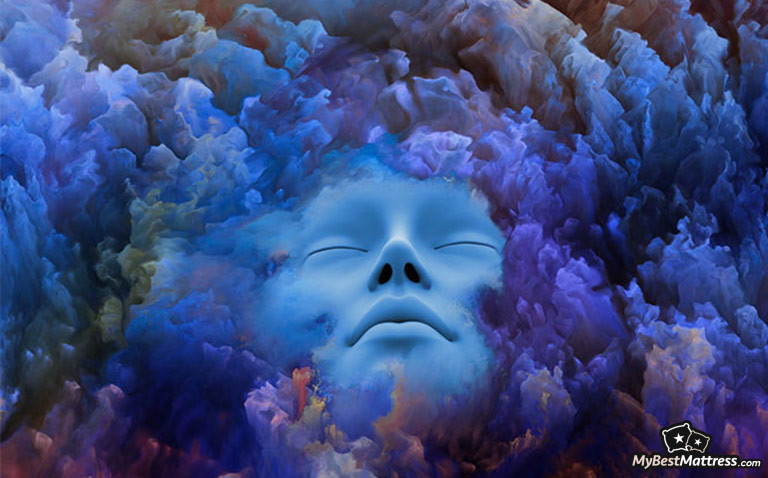
Most people are used to having vivid dreams while they sleep. Some might enjoy this part of sleep, while others only endure it because they have to. Despite the fact that we all experience them, it still remains a mysterious topic, and you may often catch yourself thinking, “what are dreams?” or “why do we dream?”
I’m here to answer these questions. After reading this article, you’ll be able to understand the possible reasoning behind dreaming and also answer the question of why do we have dreams.
Table of Contents
- 1. Why do we dream? The reasoning behind.
- 1.1. Dreams as a Way to Cope with Emotions
- 1.2. Dreams As a Memory Aid
- 1.3. A Chance to Get Creative
- 1.4. Protection from Possible Threats
- 1.5. A Window to Your Subconsciousness
- 2. Types of Dreams and What They Are
- 2.1. Daydreams
- 2.2. Night-Time Dreams
- 2.3. Nightmares
- 2.4. Lucid Dreaming
- 3. Dream Analysis
- 4. Conclusions
Why do we dream? The reasoning behind.
Despite considerable advancement in scientific dream research, there’s still no definite answer to the question of why do we dream. To put it simply, dreams are hallucinations that you experience while sleeping. They are the most active during REM (rapid eye movement) sleep stage. As the name suggests, during REM, your eyes move rapidly, heartbeat and breathing quicken, and your brain activity rises.
Reasons for dreaming are still being researched. Here are a few theories of why do we dream.
Dreams as a Way to Cope with Emotions
Dreams exist to help your brain sort itself and deal with all the input it had in the day. More often than not, daily experiences reflect in your dreams. Your emotions and everyday activities undoubtedly affect the content of your dreams.
You can get proof of that in your dreams. For example, being stressed out results in more hectic dreams, being in a new relationship might make you dream about that person a lot. If you’re daydreaming about a vacation, it’s likely to show in your dreams too. The dreams aren’t usually random as the connections to real-life events are obvious.
Latest Saatva Coupon Found:
UP TO $500 OFF
Limited-time Saatva Sale
We're sharing a limited-time Saatva mattress discount with our readers! Grab this deal & enjoy your new mattress with huge discounts.
Dreams As a Memory Aid
Another answer to why do we dream could be that it helps the memory, both long and short term. You must have heard that sleeping on the newly gathered information is beneficial. That’s why students are often advised to get a good night’s sleep. Dreaming helps to settle it down and organize freshly obtained knowledge.

Furthermore, it also helps you forget. The amount of information we get in a day is abundant. Retaining it all could lead to a brain’s burnout. Dreaming can ease that as it filters the vital info and deletes the lesser important one.
The direct link and how it’s done are yet unclear, but the tendencies show that dreaming rests your brain and gives it some off-time to deal better with the stimuli you got during the day.

Did you know?
Have you ever wondered which mattresses are approved as the best for sleep?
See & compare TOP mattresses side by sideA Chance to Get Creative
Maybe you looked why do we have dreams up after the silliest dream you’ve ever had just to understand your body. But I’m here to tell you that it’s completely normal. Dreams are not supposed to be logical.
In your day-to-day life, you function as a logical human being; at least that is what is expected from you. Dreaming is the complete opposite of that. That’s an opportunity to let your imagination run wild. And it often does.

Dreams can be a perfect inspiration for artistic creations. Waking up from an exciting dream can inspire artists, or wannabe artists, to create something new that would reflect what they saw in their dreams. That’s what dreams do; they inspire you.
Protection from Possible Threats
This one might not be as pleasant as creativity, but it's definitely important. That unpleasant answer to why do we dream is to learn to protect ourselves. That happens because the most active part of the brain while you dream is the amygdala. It’s responsible for the fight-or-flight and survival instincts.
So, when you dream you're also learning a skill - how to react in stressful situations. You may perceive the problem of why do people dream this way - it’s a way to train your body to cope with threats.
A Window to Your Subconsciousness
One more way to answer why do people dream is that it helps them to explore their own subconsciousness. When you’re asleep, your subconsciousness is still active: it controls your breathing, your organ functions, and other bodily activities. This way, when the consciousness isn’t functioning, it’s the only part that can interfere with your dreams.
Analyzing that, you can get an insight into why do we dream what we dream problem, your secret desires, fears, and concerns. It’s often the case that you don’t consciously realize your feelings or the impact something has on you, but dreaming about that implies that it’s more important to you than you thought it was.
Types of Dreams and What They Are
Now that we covered why do we dream it's time to talk about the types of dreams. There are four types of dreams. They differ in their functions, content, and your own activeness in them. Most of them occur while sleeping, except for daydreaming, which is a conscious daytime activity.
Daydreams
Daydreaming might not answer the question of why do people dream. Nevertheless, it’s essential to realize that dreams are not restricted to sleep.
Daydreaming, unlike dreaming while you’re asleep (which is a stream of subconsciousness), is a conscious activity. It occurs whenever you distract your attention from current ongoing events to more inward thoughts.

Daydreams can be either about the past or the future. They’re like small clips from your conscious mind that usually represent your wishes and fantasies, and most of the time, they’re pleasant. Day time dreaming keeps you entertained and saves you from boredom, though it can also help you visualize your future.
Night-Time Dreams
It's time to cover the most basic and also the broadest type of dreams - your usual night-time dreams. The most straightforward answer to what are dreams is that they’re short movies you see when you’re asleep. Dreams include images, sounds, voices, thoughts, and other sensations. They could also be called windows to your subconsciousness as that’s what they represent.
Our waking lives influence dreams and often portray our individual selves from a different point of view.
Nightmares
If your night isn't as pleasant to have fun dreams, you might have nightmares. Thinking about nightmares, you may wonder, why do we dream at all if it can be that unpleasant. And yes, nightmares are vividly realistic horrifying dreams. They induce fear and make your body react accordingly: your heart starts pounding, you may get sweaty, and you’ll probably experience all the symptoms you’d have facing your greatest fear.

Nightmares mostly occur in the early morning hours - when you’re in the REM sleep stage. REM phases tend to get longer the longer you sleep; this way, nightmares are more likely to happen. Waking up from a bad dream may make you feel uneasy for the rest of the day. You can’t help but think about the horrible things you witnessed while you were asleep. This may affect your mood negatively.
The main topics of nightmares differ, but there some more common ones like falling, being embarrassed in public situations, all kinds of fears portrayals, and many more. Although if you’ve had a traumatic experience recently, it might be there in your nightmares too. That’s because they’re one of the major signs of post-traumatic stress disorder.
Nightmares may also disturb your sleep. One of the reasons for waking up at night, and not being able to fall asleep again are nightmares. Sleep disturbance, or deprivation shouldn’t be taken lightly. Constant lack of sleep may take a toll on both your physical and mental health.
Lucid Dreaming
The last type of dreams are lucid dreams. Lucid dreams are a type of dreams that you can control. They’re basically a fusion between your consciousness and your subconsciousness. What differentiates lucid dreams from the common dreams is that the dreamer is aware of the fact that he or she is dreaming.
Despite it sounding odd and uncommon, many people experience that. For some, it may seem scary, and others find it super exciting.
Some enthusiasts find it so exciting they try to train themselves to lucid dream. Many of them succeed. There are plenty of tutorials online that teach you how to lucid dream in just a few steps. I guess we could call it a hobby.
Dream Analysis
Dreams and reasons for why do we dream have been analyzed for thousands of years now. In ancient societies, they were thought to be a form of supernatural communication.
Dreams used to be taken very seriously, lots of things are recorded to have happened simply because a ruler or a shaman had a dream that it would be beneficial to make a decision based solely on a dream they had.

Not much has changed now. Some people genuinely believe that their dreams are important when it comes to decision making. Lots of plans get canceled simply because someone had dreamt that a disaster was going to happen.
What’s Good out of It?
Understanding your dreams helps you get to know yourself and your subconsciousness better. You stop seeing dreams as random images and finally make sense out of all the mess that’s in your head. Understanding the contents, you might as well find a way to answer the question of why do we dream.
One of the more serious spheres that employ dream analysis is psychotherapy. It’s used to help patients analyze their problems. Not only are they appreciated because of their proof of particular worries, think nightmares, but interpreting them helps a person notice some aspects that go unnoticed in their everyday life.
The way it goes is that a person tells their therapist the dream. Then it’s broken down into smaller sections, and eventually, certain aspects or symbols are talked about. Analyzing them freely, a person seems to associate the dream with particular aspects of their own life.

This way, it’s easier to understand your personal concerns or even positive things that matter to you.
How Do You Analyze Your Dreams by Yourself?
There are two ways to analyze your dreams and understand why do we dream. One of them is using any kind of dream dictionary. Another way is to analyze them by yourself.
Using Dream Dictionaries
There are plenty of dictionaries online, but there are also printed books. Your grandma may have one - mine does. Most of the signs from dreams will probably be described similarly, although the definitions may slightly differ in different dictionaries. After all, dream analysis is not really a concrete science.
Opening one, you will not find your whole dream explained, especially if it was an elaborate one. The key is to break it down into smaller aspects that seem to be relevant to you and only then try to find what they could mean.
Analyzing Dreams Using Your Own Imagination
Another way to understand why do we dream and realize the meaning behind it is to analyze your dreams by yourself. It doesn’t require much knowledge beforehand; all you need is your dreams, a pen, a piece of paper, and an open mind.

First of all, you need to record them. It’s usually done by writing them down straight after waking up. Then you need to identify what’s important and how does that make you feel. Try not to eliminate details that may seem mundane and usual, especially if it’s a reoccurring dream. That just signifies it’s important to you.
After you’re finished identifying the essential aspects, try to think about what the aspects could mean. Associate them with the current affairs of your life. If you’re dreaming about people, concentrate on your relationship with them. Don’t try to keep it all literal, use your imagination - assign roles to particular objects.
Creativity is the key here.
Having done that, you will have learned more not only about yourself, but also you’ll also practically see the purpose of "why do we dream" in general. You’ll notice how connected they are to your life.
Conclusions
The questions of why do we dream or why do we have dreams are rather broad, and science is yet to answer them. But there are many theories for the reasons behind. Such as that dreams help to cope with emotions, improves your memory, or let you rest from being logical.
Others say that dreams train you for protecting yourself or help you with self-reflection. That’s the closest we can get to answering why do we dream.
It might be a bit easier to define the answer to "what are dreams?" as most of us experience them and see that dreams are just little clips that we get to see while we are asleep. Although there are a few kinds of them. Some might not be as pleasant - they’re called nightmares.
Despite this much confusion, it’s possible to make sense of your own personal dreams. You may use a dream dictionary or try to do it yourself. It might sound a little silly, appointing this much importance to them, but it shows that throughout history, dreams were taken even more seriously than we do now.
You can also check out some courses on dream interpretation provided by Udemy. However, before moving straight to their website, take a look at the available coupon codes that will provide you with great savings.
I hope I helped you answer your questions. If you'd like to know more about sleep-related topics and issues, feel free to check out our other sleep guides.
Leave your honest feedback
Leave your genuine opinion & help thousands of people to choose the best mattress. All feedback, either positive or negative, are accepted as long as they’re honest. We do not publish biased feedback or spam. So if you want to share your experience, opinion or give advice - the scene is yours!













